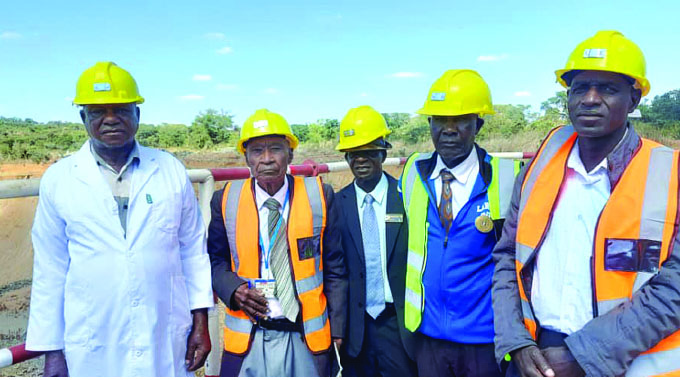Mhondoro’s Concession Hill: A theatre of mystery, shock

Walter Nyamukondiwa Mashonaland West Bureau
IN the midst of the boring sounds, explosions, bellowing dust and the groaning of vehicles of varying sizes criss-crossing the Chiware Hills in Mhondoro, lies baffling mysteries and historical claims that challenge established perspectives.
From regularly swept and neat surroundings to polished artefacts, the hills remain a theatre of mystery and bewilderment.
Answers to the question of how, when and who cleans the area and the caves remain a mystery.
Outside the historical overhang of where King Lobengula and Charles Rudd signed the Rudd Concession, lies the mysterious and revered ancestral dwelling place, occasionally announcing its presence with strange sounds and sightings.
Tales of massive snakes, which often block roads after supposed infringement of local traditional customs, are commonplace.
This brings to the fore the nexus between mining and traditional beliefs as most people and companies that have undertaken mining ventures there, say the two are indispensable.
Another staggering perspective is that the area carries historical significance.
To the people of Ngezi, whose traditional leadership answers to the totem of Mhofu, excited by the Mupamombe praise name, King Lobengula and Charles Rudd signed the Rudd Concession in Mhondoro on the hill now known as Concession Hill.
Encircled by massive mining activity, the Concession Hill blends with others and if not for the red and white mobile network transmitter mast and houses on its foot, one cannot easily separate it from the others.
It is on this hill that King Lobengula reportedly signed the Rudd Concession on October 30, 1888, giving Charles Rudd and company Carte Blanche access to the country’s mineral resources.
In the history books, King Lobengula and Charles Rudd signed the Rudd Concession in present day Bulawayo.
Mambo Mupamombe, born Barnabas Machipisa, contends that the Concession Hill holds historical and spiritual significance to the nation and the Mhondoro area.
“This is the hill where permission was granted to Charles Rudd to mine in the country. That is where all the sweeteners to the deal were concluded,” contends Mambo Mupamombe.
“It is a sacred hill and we have pleaded with miners here at Pickstone Mine not to cover up the hill or carry out mining activities and we call on Government to make the area a tourist site so that people can visit and enjoy the country’s history related to our minerals.”
The Concession Hill is now within Pickstone Peerless Mine’s claims, where operations led to its partial covering before the mine stopped.
Pickstone Mine general manager, Engineer Alfred Madowe, confirmed that the mine had decided to isolate Concession Hill owing to its historical and cultural significance.
“Within the mine, we have Concession Hill where the right to mine was given to Charles Rudd in 1888,” explained Eng Madowe.
“The Concession Hill is about 2km from our offices. That is where King Lobengula granted the first concessions. Over time, the mine has changed ownership from Rio Tinto, which started operations around the 1900s to several others including ACR (African Consolidated Resources) from whom we took over operations.”
The Rudd Concession was a written concession that gave Charles Rudd and others exclusive mining rights in Matabeleland, Mashonaland and other surrounding territories.
Mambo Mupamombe said the desecration and violation of traditional rites and customs led to ancestors withholding gold, and the occurrence of mishaps leading to deaths.
There are widespread stories of people seeing long snakes that would block the road that passes through Concession Hill until the traditional leadership goes to the site to plead with the ancestors.
A villager, Mr Sandas Chigiya, agrees with the tales.
“We have seen very big snakes, some with the diameter of wooden poles used by TelOne and Zesa for their transmission cables. You cannot see the head or the tail,” he said.
“When it happens people spend hours with long queues of cars on either side. In such instances, people have to call Mambo Mupamombe who sprinkles snuff on the snake and pleads with the ancestors to allow people to pass and go on with their business.”
Another villager, Mr Victor Kamuchenga, corroborated the strange occurrences.
To the traditional leadership that would be a sign that something was wrong and they have to appease the ancestors.
“In one incident, Mambo Mupamombe arrived after being called and sprinkled snuff before pleading with the ancestors to let people pass.
“In this area, we have snakes such as python, black mamba and cobra,” said Mr Kamuchenga.
If the ancestors are angry, said Mambo Mupamombe, they will withhold the gold and not reward people mining for their effort.
“We are custodians of the customs and traditions in the area. We speak to the ancestors starting from this area, covering the mountains we call Rimuka up to the area in Kwekwe where we have Ziscosteel,” said Mambo Mupamombe.
“When there is need for any traditional rites to be conducted, we are called. People wanting to carry out mining operations in the area have to be introduced to the ancestors in a traditional way.”
At some time, Mambo Mupamombe caressed a snake that had covered the road, talking to it and pleading that the ancestors to make way for the people to pass.
Over the years, people in Mhondoro, contend that those who have complied and consulted the traditional leadership on how they should conduct their mining activities have been successful.
“Some comply, but soon forget and they will start saying there is no longer any gold or that what they are getting is not viable to continue,” he said.
“At one time, a miner came and asked to be guided and we introduced them to the ancestors. They got gold to the extent that almost everyone was able to buy a car. However, they starting disregarding what we had agreed with them from the ancestors.”
One of the conditions was they give the community cash equivalent to 30 cattle at the end of 2014 for the benefit of the community, but they reneged on the agreement.
The local spirit mediums and traditional leadership took the payment as compensation for the disturbance of the ruins at one of the hills.
Said Mambo Mupamombe: “They (the miners) said they owned the mine (and cannot pay) but gold output declined and he moved to the shafts left by Rio Tinto. That did not work until they left.”
The people of Mhondoro contend that the key to successful mining was to preserve the sanctity of Concession Hill and others in the Chiware Hills, while amplifying the historical significance of the hills.









Comments